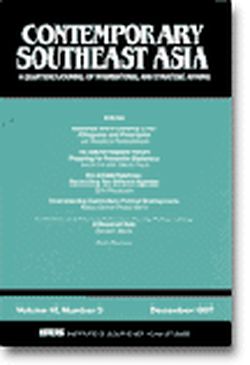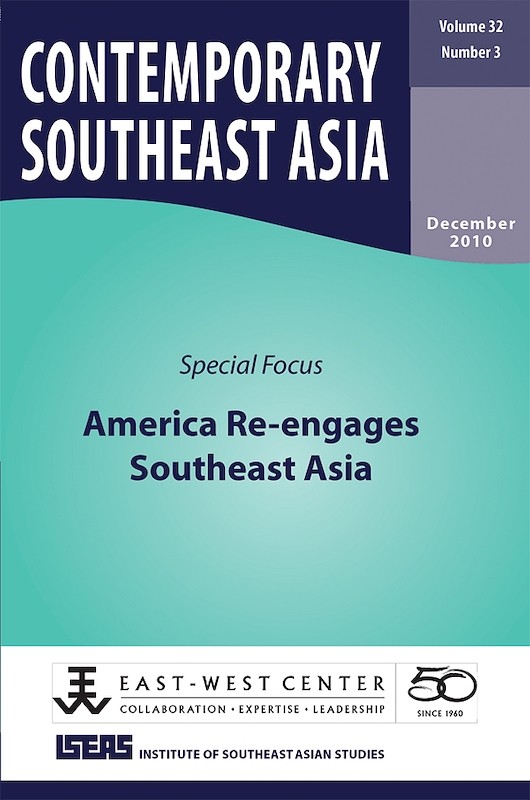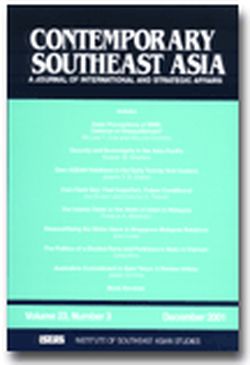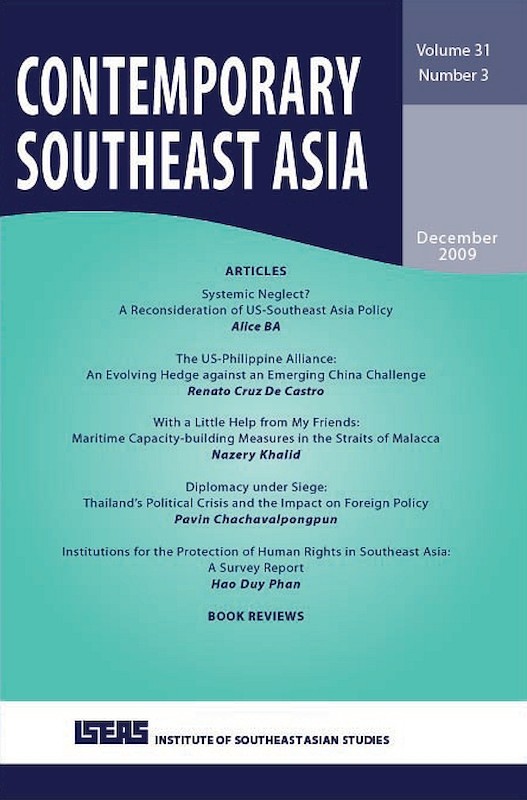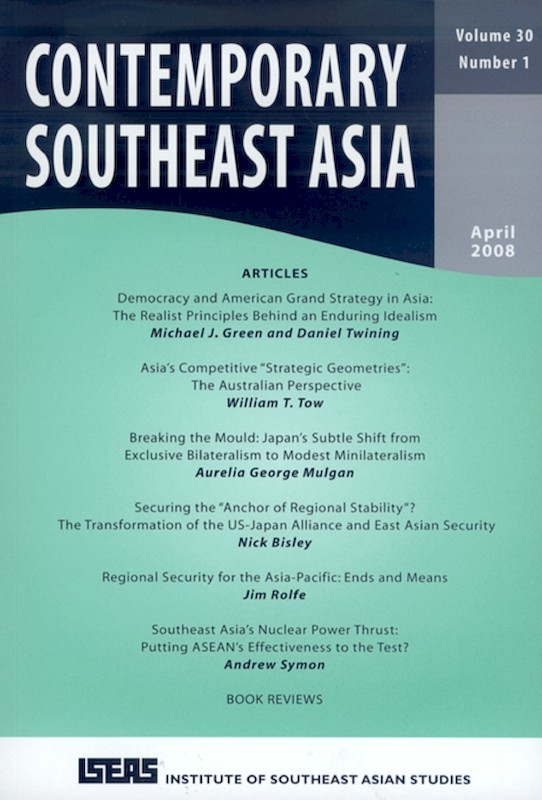Contemporary Southeast Asia: A Journal of International and Strategic Affairs Vol. 28/2 (Aug 2006)
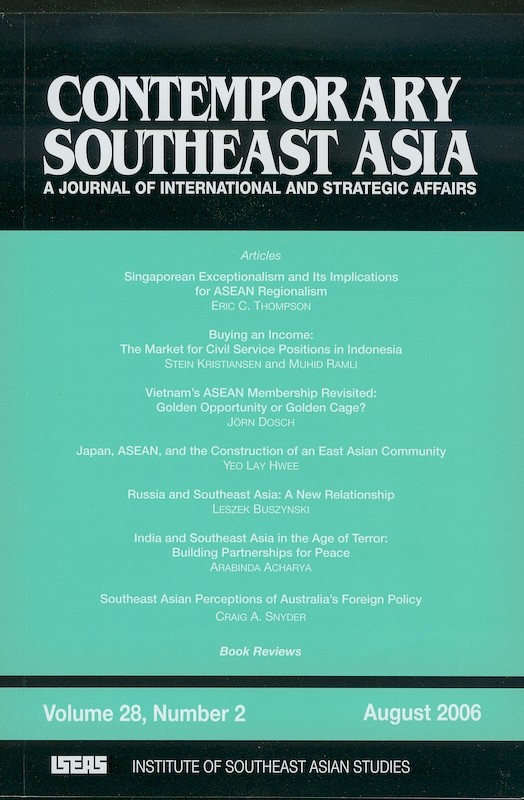
Date of publication:
September 2006
Number of pages:
180
Code:
CS28/2
Contents
-
Contemporary Southeast Asia: A Journal of International and Strategic Affairs Vol. 28/2 (Aug 2006)
-
Preliminary pages, by Eric C Thompson, author
- ARTICLES
-
Singaporean Exceptionalism and Its Implications for ASEAN Regionalism, by Stein Kristiansen, Muhid Ramli, authors see abstractSingapore is a unique polity in the world and in Southeast Asia. A survey conducted at the National University of Singapore (NUS) of perceptions generally of countries worldwide and specifically of the Association of Southeast Asian Nations (ASEAN) demonstrates a sense of Singaporean exceptionalism. While respondents to the survey have a distinct sense of ASEAN as a regional grouping, they see Singapore as largely apart from rather than a part of Southeast Asia. The article examines the results from Singapore, with reference to comparable surveys carried out in four other ASEAN member states. The unique sense of Singaporean exceptionalism is attributed to Singapore's own unusual characteristics, struggles with national identity, and overriding economic imperatives associated with nation survival. This sense of exceptionalism exemplifies challenges to ASEAN integration that are not only of relevance to Singapore but to the region generally.
-
Buying an Income: The Market for Civil Service Positions in Indonesia, by Jorn Dosch, author see abstractIn Indonesia, positions in the Civil Service are subject to hidden market transactions. The demand for stable sources of income is high, and lack of transparency makes sales possible by government officers in core positions. The recent decentralization reforms have blurred borders of responsibility and lines of reporting in the bureaucracy and facilitated increasing rent-seeking at local levels. The article reports from a study of payment for government positions in an urban and a rural district in a province in Indonesia, Nusa Tenggara Barat. The survey reveals that prices for positions are rising and vary among departments in accordance with available opportunities to boost their income. Prices are higher where many projects are available and the compensation is good. The article concludes that current practices are unethical and hurt the society and that increased transparency in employment procedures must be in place before things can get any better.
-
Vietnam's ASEAN Membership Revisited: Golden Opportunity or Golden Cage?, by Yeo Lay Hwee, author see abstractVietnam's membership in ASEAN, which was achieved in 1995, is widely regarded as a powerful symbol and most significant result of Hanoi's new foreign policy as part of the doi moi renovation process. This article elaborates on the question as to whether ASEAN membership has been as beneficial to the conduct of Vietnam's foreign affairs as it is generally assumed. Does ASEAN indeed present a continuous golden opportunity for the management of the country's international relations or would it be more accurate to view the Association as a golden cage, which offers clear opportunities in terms of the management of regional order but also increasingly restricts Vietnam's foreign policy options? The article elaborates on the impact of ASEAN membership on Hanoi's bilateral relations with China, the United States, and its Southeast Asian neighbours, establishes to what extent Vietnam's initiatives towards a peaceful resolution of the South China Sea disputes are in line with ASEANs, discusses Vietnam's foreign economic policy interests and also tries to shed some light on the actors and structures in the making of the country's foreign affairs.
-
Japan, ASEAN, and the Construction of an East Asian Community, by Leszek Buszynski, author see abstractIn his 2006 New Year message, Japanese Prime Minister Junichiro Koizumi pledged to improve relations with neighbouring countries. Underlying this message is perhaps the understanding that its relations with its neighbours, particularly its near neighbours China and Korea have been less than ideal. However, Prime Minister Koizumi also made it clear that Japan s foreign relations would remain based on the Japan-US alliance. This perhaps reiterated what his Foreign Minister Mr Taro Azo said not long after he was appointed foreign minister that in Japan s foreign relations, it is US first, Asia second . No one doubts the importance of the Japan-US relationship, just as no one would underestimate the importance of getting Sino-US relations right if the stability of the region is to be assured. However, while China has been working hard to maintain a proactive and responsible regional policy in Asia, Japanese policy towards Asia has at best been unclear and uncertain, and at worst raised serious questions about Japan s perception of itself and its relations with the rest of Asia. One wonders if Japan, though geographically located in East Asia, considers itself politically and psychologically East Asian. This article focuses on Japan s relations with Southeast Asia and ASEAN, and examines how Japan s ambivalent attitude towards the East Asian region may impact the construction of an East Asian Community which ASEAN purports to be in the driving seat.
-
Russia and Southeast Asia: A New Relationship, by Arabinda Acharya, author see abstractRussia has been struggling to develop a relationship with the Association of Southeast Asian Nations (ASEAN) and to be included in Asia-Pacific regionalism. The rebirth of Russia after the demise of the Soviet Union in December 1991 brought with it a repudiation of superpower ambitions and outlying areas such as Southeast Asia dropped in terms of priorities. It was only after Putin emerged as president in April 2000 that Russia's interest in Southeast Asia rekindled, and there were two reasons for this. The first was the recognition of the importance of Asia-Pacific regionalism for Russia's development and that the economic development of Siberia and the Russian Far East required closer integration with Asian regional institutions. Under Putin, Russia moved to forge closer ties with ASEAN and to stake a claim in an emerging East Asian regionalism, a claim that was supported by Malaysia. Moreover, Putin became Russia's major arms salesman and sought to expand arms sales with ASEAN actors: Vietnam, Malaysia, Indonesia, and Thailand. When the East Asian Summit (EAS) was held in Kuala Lumpur in December 2005 Russia was poised to assume a new role in Southeast Asia.
-
India and Southeast Asia in the Age of Terror: Building Partnerships for Peace, by Craig A Snyder, author see abstractWith September 11, terrorism has come to dominate the security concerns of nation-states, especially in Asia, affecting both inter- and intra-regional relations significantly. Though for many Asian countries terrorism was nothing new, threats of transnational terrorism introduced new security challenges, which significantly changed the nature of domestic politics and state-society relations of the regional states and relations among them and with states in other regions. In the new dynamics, the traditional bilateral alliance systems that underpinned much of the security structure and relations in the past are found to be inadequate to deal with the challenge of transnational terrorism. There is thus a need for cooperation among the nations in the region and greater engagement with extra-regional partners through multilateral arrangements. Both India and Southeast Asia grapple with an array of security threats including those from transnational terrorism. Ironically, terrorism provides unique opportunities to both to work together. This article argues that the common desire to fight terrorism could be the imperative that would establish foundations for mutually beneficial partnerships both in their economic and security relations. India and Southeast Asia have substantial experience to deal with terrorism. Both could leverage their mutual expertise to deal with the threat decisively. Besides, economic cooperation between India and the countries in Southeast Asia has the potential to accelerate the pace of development, which in turn could help them to resolve both intra- and inter-regional tensions and to develop the quality of life.
-
Southeast Asian Perceptions of Australias Foreign Policy, by Anthony S K Shome, author see abstractThis article argues that while the US alliance remains at the forefront of Australian security policy, the deepening of ties between the United States and Australia has the potential to complicate Australia's relations with its Southeast Asian neighbours. Moreover, the manner in which the Howard government has attempted to manage this shift in policy has only exacerbated the problem. Australian pronouncements of support for the US policy of preemption, the perceived preference of the Australian Prime Minister to take on the role of Deputy Sheriff, and the unwieldy approach taken by the Australian government in policy announcements pertaining to maritime and security policy have caused unnecessary tension and mistrust between Australia and some Southeast Asian states.
- BOOK REVIEWS
-
BOOK REVIEW: Ousted! An Insiders Story of the Ties That Failed to Bind. By Patrick Keith, by P Ramasamy, author
-
BOOK REVIEW: Protest and Possibilities: Civil Society and Coalitions for Political Change in Malaysia. By Meredith L Weis, by Ramses Amer, author
-
BOOK REVIEW: Revolution, Reform and Regionalism in Southeast Asia: Cambodia, Laos and Vietnam. By Ronald Bruce St John, by Sukardi Rinakit, author
-
BOOK REVIEW: The Internet in Indonesias New Democracy. By David T Hill and Khrisna Sen, by Ron Huisken, author
-
BOOK REVIEW: A World of Regions: Asia and Europe in the American Imperium. By Peter J Katzenstein, by Kyaw Yin Hlaing, Helen E S Nesadurai, authors
-
BOOK REVIEW: Globalization and Economic Security in East Asia. Edited by Helen E S Nesadurai

